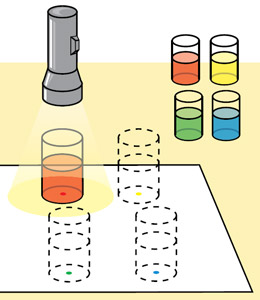Mix and Match

Required Materials
1 piece of white paper
4 clear plastic cups
Red, yellow, green and blue food coloring
Pencil
Flashlight
Newspaper
4 cotton swabs
Water
Ruler
Activity Directions
- Cover your workspace with newspaper.
- Place a few drops of red food coloring on one end of a cotton swab.
- Using the swab, make a dark red dot about 2 cm in diameter on the white paper. Repeat this process with each of the remaining 3 colors.
- Fill each cup halfway with water.
- Add 3–5 drops of food coloring to each cup (a different color in each cup), and mix with a matching swab.
- Turn on the flashlight and darken the room.
- Hold the cup of red water directly above the red dot.
- Shine the flashlight straight down into the cup of red water and look at the red dot. What color do you see? Record your results in the chart.
- Repeat the process until you have tried all the water colors with all the colored dots. The data chart will help you keep track of the combinations you tested.
-
Water Color Dot Color Color You See Red Red Red Blue Red Yellow Red Green Blue Red Blue Blue Blue Yellow Blue Green Yellow Red Yellow Blue Yellow Yellow Yellow Green Green Red Green Blue Green Yellow Green Green
-
- What did you discover about mixing color and light? Does it make a difference if you set the cup down or hold it above the dot? Do you get the same result for blue if you make really dark blue water?
- You’ve just mixed different wavelengths together. When you are looking into the red water as it is held above a yellow dot, you see two wavelengths at the same time. The wavelength for red and yellow combine and you see orange.
- Visible light contains ROY G BIV, with three of the seven colors considered primary: red, yellow, and blue. Primary colors can be combined to make the other colors of the rainbow. Red + yellow = orange. Look at where orange is in ROY. Now what colors make green? Is the order of colors in a rainbow a coincidence?
Want to mix colors online? Visit these cool websites:
Project Lite: Addition PhotoProject Lite: Einstein
Want to Learn More? Read an article related to this activity:
To find this experiment and many more please download the Lighten Up! Discovering the Science of Light book, developed through a partnership with the Optical Society of America’s Foundation (OSAF) and the Girl Scouts of the USA.









